

Antarctica warms, which threatens penguins. New evidence from satellites and weather stations suggests that way down south, Antarctica is feeling the heat.
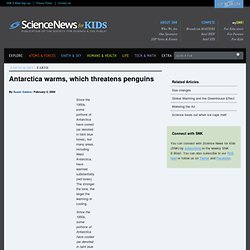
And that’s not good news for penguins. Scientists studying climate change knew some coastal areas of Antarctica were warming. But data from weather stations inland — at the South Pole and Lake Vostok — indicated these sites were actually getting colder. Researchers suspected that the whipping winds and freezing temperatures that grip these interior regions were keeping the rest of the continent cool, as well. To check that out, a group of scientists decided to take a cold, hard look at the data. It shows that much of this continent — particularly the West Antarctic Ice Sheet — had been warming in recent decades. Just as the scientists suspected, parts of East Antarctica had cooled slightly between 1957 and 2006. Global Warming and the Greenhouse Effect.
Earth’s atmosphere works something like a giant glass greenhouse.
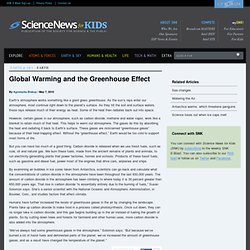
As the sun’s rays enter our atmosphere, most continue right down to the planet’s surface. As they hit the soil and surface waters, those rays release much of their energy as heat. Some of the heat then radiates back out into space. However, certain gases in our atmosphere, such as carbon dioxide, methane and water vapor, work like a blanket to retain much of that heat. This helps to warm our atmosphere. But you can have too much of a good thing. By examining air bubbles in ice cores taken from Antarctica, scientists can go back and calculate what the concentrations of carbon dioxide in the atmosphere have been throughout the last 650,000 years.
Clean Air Kids: Greenhouse Effect & Global Warming. The Earth is wrapped in a blanket of air called the 'atmosphere', which is made up of several layers of gases.
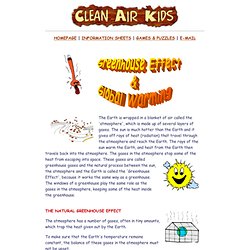
A Student's Guide to Global Climate Change. The Kids Guide To Global Warming. People are seeing change all over the world.
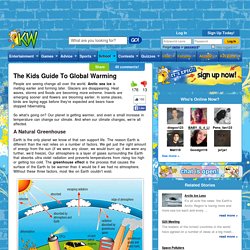
Arctic sea ice is melting earlier and forming later. Glaciers are disappearing. Heat waves, storms and floods are becoming more extreme. Insects are emerging sooner and flowers are blooming earlier. In some places, birds are laying eggs before they’re expected and bears have stopped hibernating. So what’s going on? A Natural Greenhouse. NASA's Climate Kids. What is global warming? Global Warming For Kids. ESchoolToday: Ozone depletion. Introduction: All about Ozone Like other environmental problems, Ozone Depletion is one that is very troubling, and rightly so, considered as a major environmental issue by all nations on the earth.
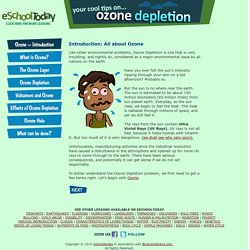
Have you ever felt the sun's intensity ripping through your skin on a hot afternoon? Kids.net.au: Global warming. See Global warming/temp for a proposed change in the layout of this entry Global warming is the increase over time of the average temperature of Earth's atmosphere and oceans.
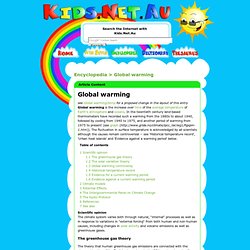
In the twentieth century land-based thermometers have recorded such a warming from the 1880s to about 1940, followed by cooling from 1940 to 1975, and another period of warming from 1975 to present (see graph ( The fluctuation in surface temperature is acknowledged by all scientists although the causes remain controversial -- see 'Historical temperature record', 'Urban heat islands' and 'Evidence against a warming period' below. Scientific opinion The climate system varies both through natural, "internal" processes as well as in response to variations in "external forcing" from both human and non-human causes, including changes in solar activity and volcanic emissions as well as greenhouse gases.
Eco Friendly Kids: Global Warming. Author: Beth Morrisey MLIS - Updated: 16 November 2012| Comment Many people consider climate change and global warming the greatest environmental challenges facing the world today.
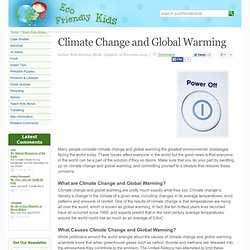
These issues affect everyone in the world but the good news is that everyone in the world can be a part of the solution if they so desire. Make sure that you do your part by swotting up on climate change and global warming, and committing yourself to a lifestyle that reduces these concerns. WWF: Climate Change. Shop to Support WWF Shop at AmazonSmile to support our global conservation efforts every time you buy.
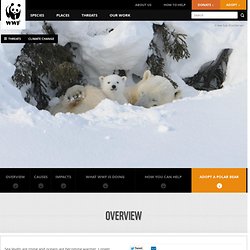
It’s the same Amazon.com you know—same products, same prices—and 0.5% of each purchase price is donated back to WWF. WWF: Climate change. Carbon dioxide, or CO2, is the most significant of the gases in our atmosphere which keep the Earth warm. 4 billion years ago its concentration in the atmosphere was much higher than today - 80% compared to today's 0.03%.
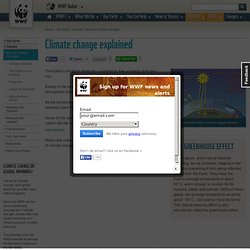
But most of it was removed through photosynthesis over time. All this carbon dioxide became locked in organisms and then minerals such as oil, coal and petroleum inside the Earth's crust. A natural carbon dioxide cycle keeps the amount of CO2 in our atmosphere in balance. Decaying plants, volcanic eruptions and the respiration of animals release natural CO2 into the atmosphere, where it stays for about 100 years. The Guardian: Climate Change. ESchoolToday: Climate Change. Introduction to Climate change Many people make Climate Change and Global Warming a scary and difficult thing to understand, but it’s not.
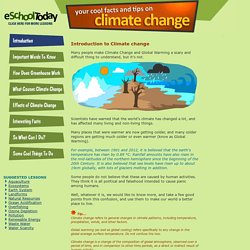
Scientists have warned that the world's climate has changed a lot, and has affected many living and non-living things. Many places that were warmer are now getting colder, and many colder regions are getting much colder or even warmer (know as Global Warming). For example, between 1901 and 2012, it is believed that the earth's temperature has risen by 0.89 °C. Rainfall amounts have also risen in the mid-latitudes of the northern hemisphere since the beginning of the 20th Century.
Some people do not believe that these are caused by human activities. Well, whatever it is, we would like to know more, and take a few good points from this confusion, and use them to make our world a better place to live. Tip...